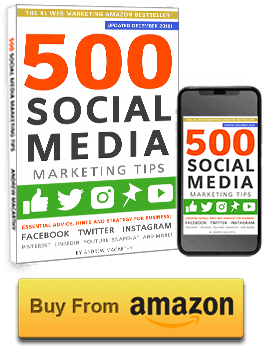5 Ways to Use Pinterest Guided Search to Increase Exposure For Business
/Do you use Pinterest for business? You will have noticed the recent introduction of a new method of search - Guided Search - on the desktop site. Its benefits for consumers of Pinterest content are obvious, but it also opens up a variety of opportunities for businesses. In this post, I'm going to show you 5 Ways to Use Pinterest Guided Search to Increase Exposure For Business. But first... a quick recap.
A quick recap: what is Pinterest Guided Search?
Pinterest Guided search is a way to help Pinterest users find things they didn't even know they were looking for. When you search for something, descriptive guides appear above the results to help you sift through ideas from other Pinners, and steer you in the direction that develops in your mind. As you can see in the above example, a simple search for "party", throws up a whole host of initial (and topical) suggestions. Clicking on any one of these will provide relevant pins, as well as more specific search suggestions related to the chosen keyword, e.g. cocktails, food, decorations, games, etc.
How you might leverage Pinterest Guided Search for business isn't immediately obvious, but let me give you some examples...
1. Learn what your customers are searching for
As explained above, Pinterest Guided search provides users with ongoing suggestions as they search. Let's say you were in the business of selling dog treats. Simply searching "dog treats" on Pinterest - and exploring the results - will provide you with useful insight into the most popular and trending types of content around the topic. In turn, you can use this information to tailor your ongoing content strategy.
Above, I searched "dog treats", then clicked on the "home made" string to find even more suggestions. Which home made dog treats are currently popular with Pinterest users? Is there a gap in the market I can exploit?
2. Invent your own Guided Search terms
Pinterest provides a wealth of Guided Search suggestions (and you can see even more by clicking the > arrow when results are displayed). However, if you aren't being steered in the direction you hoped, don't be afraid to continue to customise your search.
Above, I have manually added the keyword "natural" to hone in on the content I want to see. Do my own pins appear? What additional ideas appear? What are my competitors doing that I'm not?
3. Optimise new and existing Pins to get Pins found
With Guided Search taking Pinterest's "accidental discovery" angle to the next level, it is more important than ever to ensure that your Pins have the best chance of being found - and that starts from the moment your images or videos are uploaded or pinned. Use multiple keywords to describe pins, both literally and the more broadly. For example, my dog treats wouldn't just be a "dog treat". They might be "Recipe for healthy Home made dog treats, perfect for a pet's Christmas gift. They contain oats and pumpkin." As well as a useful description for users, we give Pinterest lots of great keywords - dog, treats, pet, Christmas, oats, pumpkin, home made healthy - for Pinterest's Guided Search to crawl and pick up on.
4. "Reverse" your search to discover new possibilities
Just as adding custom search terms to Pinterest's Guided Search suggestions can throw up new ideas and possibilities, so can stripping back your strategy. To take my dog treats business example again, instead of "dog treats," I might just search "dog".
In the above images, by searching "dog", suggestions like "cutest" and "training" show up. I could use the ideas I see here to weave ideas into my own content - like pairing my dog treat pins with super cute dogs, or showing how they make for a great treat after a successful day of dog training. In this way, you can spread your content's reach across categories and search terms that might not have been on your original radar.
5. Remember to target by location
When Pinterest launched Guided Search, it did so first on mobile devices rather than on desktops - different to what it has done with new features in the past. Given the majority of Pinterest's traffic now comes from mobile devices, perhaps this shouldn't be a surprise. While typing in "dog treats" (even with the help of Place Pins) doesn't return local sellers in my area - at least not yet - a shift to localised search is emerging.
For example, a search for "chicago" throws up Guided suggestions including "food" and "restaurants." If a user clicked on a pin by a restaurant in Chicago and were wowed by the images of the food, they may go on to click through to the restaurant's website, find out more information, and decide to eat there. I'm not suggesting that Pinterest is suddenly going to replace services like Yelp and Trip Advisor, but it certainly can't harm you to add your city name and location to relevant pins, so that locals and tourists alike, browsing Pinterest, have a better opportunity at stumbling across what you have to offer.
Over to you
Have the above suggestions made you think differently about Pinterest Guided Search? Will you be adapting and tweaking your strategy as a result? Let me know in the comments below!
Andrew Macarthy is a social media consultant and the author of the #1 Amazon Web Marketing Bestseller, 500 Social Media Marketing Tips.
Buy 500 Social Media Marketing Tips
Amazon US: http://www.amazon.com/dp/B007L50HE6
Amazon UK: http://www.amazon.co.uk/dp/B007L50HE6
Follow Me:
http://www.facebook.com/500socialmediatips/
http://www.pinterest.com/andrewmacarthy
http://www.twitter.com/andrewmacarthy
http://www.youtube.com/500socialmediatips













